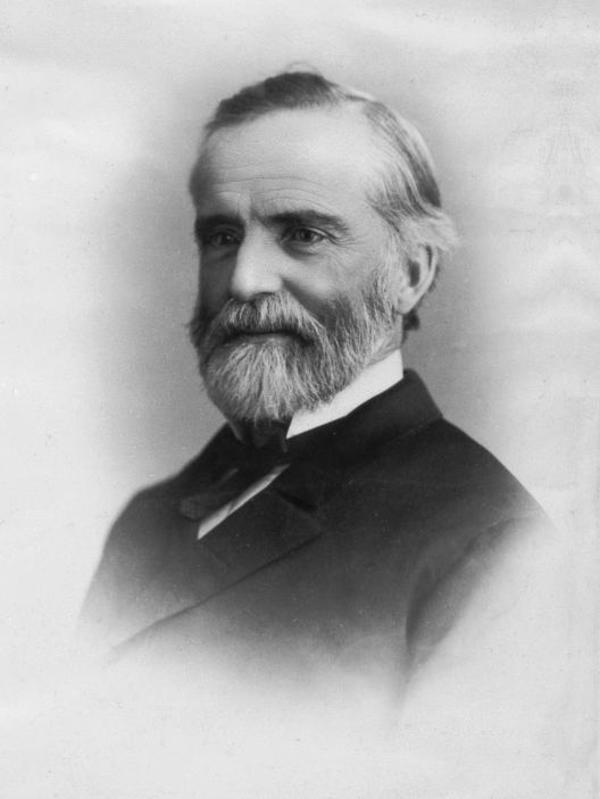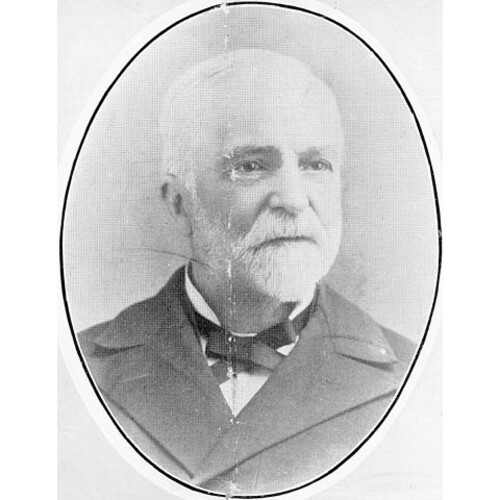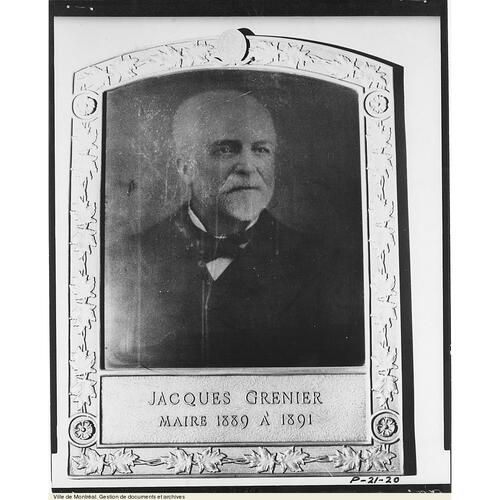
Source: Courtesy of Wikimedia Commons
GRENIER, JACQUES, businessman and politician; b. 20 Jan. 1823 in Berthier-en-Haut (Berthierville), Lower Canada, son of Antoine Grenier, a seaman, and Josephte Boulard; m. there 29 April 1845 Louise Fernet, and they had two sons; d. 5 March 1909 in Montreal.
At the age of 16, following commercial studies in Berthier-en-Haut, Jacques Grenier entered the employ of a merchant in William Henry (Sorel). In 1844 he moved to Montreal where he became a clerk with F. et J. Leclaire, dry-goods merchants on Rue Saint-Paul. A few years later he opened his own business, specializing in wholesale dry goods. On 9 April 1858 he formed a partnership with Pierre-Paul Martin to continue under the name of Grenier et Martin. This company was dissolved after seven years and Grenier invited his nephew Jacques-Hercule Giroux to join Jacques Grenier et Compagnie. Expanding rapidly, the firm became one of the largest Montreal wholesalers of dry goods. Grenier imported his merchandise mainly from France, England, and the United States, and sold it in the province of Quebec and eastern Ontario. In January 1882 he withdrew in favour of his son Adolphe, leaving the two partners $87,000 for a five-year period to guarantee that they could carry out transactions. After Giroux’s death, however, he took the business in hand again in January 1886, maintaining the name of Jacques Grenier et Compagnie.
“A self-made man, in the English manner,” according to Robert Rumilly*, Grenier was involved in numerous businesses run by English-speaking capitalists in Montreal. He was vice-president of the Montreal Cotton Company, which had been established in Salaberry-de-Valleyfield in 1874; on its board he rubbed shoulders with Sir Hugh Allan* and Andrew Frederick Gault, at a time when cotton manufacturers were reaping substantial profits as a result of all kinds of advantages granted them by municipalities. This was the period when the first amalgamations in the textile sector occurred. In 1885 Grenier himself had a hand in the merger of V. Hudon Cotton Mills Company in Hochelaga (Montreal) with the Compagnie de Filature Sainte-Anne, an operation headed by Gault and David Morrice [see Victor Hudon*]. Furthermore he was involved in the merger giving rise to Dominion Cotton Mills in 1890, as he would be in the formation of Dominion Textile in 1905. Grenier was also a promoter in 1882 of the Federal Telephone Company (incorporated in 1887) and was a director of the Montreal Rolling Mills Company and the British Empire Mutual Life Assurance Company of London. In addition he was part of the financial syndicate led by Allan that attempted in 1877 and 1882 to buy the Quebec, Montreal, Ottawa and Occidental Railway. In 1878 he had strongly objected to a proposal to route the railway line through Terrebonne rather than Montreal.
The anglophone business community in Montreal was not alone in recognizing Grenier’s merits, particularly his entrepreneurial spirit, his integrity, and his sound judgement. He sat for 26 years as a councillor or as an alderman on the Montreal city council, representing the East ward from 1857 to 1866 and Saint-Jacques ward from 1872 to 1889. In the course of these years he was chairman of the waterworks and police committees, as well, notably, as of the finance committee. His involvement on the municipal scene did not prevent him from taking an equally active part in provincial politics. A Liberal and a signatory to the 1864 anti-confederation manifesto initiated by Médéric Lanctot*, Grenier was a member of the Club National, a group of young Liberals in Montreal. In the 1878 provincial election, which ensued from the “coup d’état” of Luc Letellier* de Saint-Just, he ran as a Liberal against Louis-Olivier Taillon* in Montreal East. Despite the support of Honoré Mercier*, Louis-Amable Jetté*, and Hector Fabre, he lost by 130 votes. A man of moderate views, he was often called on to preside over large Liberal gatherings. In March 1881, for instance, a convention that brought together the leading lights of the party was held under his chairmanship, as was the great rally in the Champ-de-Mars on 22 Nov. 1885, which would result in the formation of the Parti National [see Mercier]. Grenier’s prestige made him the obvious candidate to succeed John Joseph Caldwell Abbott* as mayor of Montreal. In 1889 the first municipal election in Montreal to be held by secret ballot took place; Grenier himself was elected by acclamation and he would be returned to office in 1890 for another year.
Grenier had received another mark of recognition a few years earlier. In 1886 he had been accepted as a member of the Montreal Board of Trade, still quite a rare honour for a French Canadian. It was an even rarer honour when he was unanimously elected its first vice-president in 1888. During the very year in which he joined the board, he was chairman of a committee appointed to set up a French Canadian chamber of commerce. The project of his friend Joseph-Xavier Perrault, it came into being in 1887 and Grenier was chosen president.
A serious set-back was to cast a shadow over Grenier’s last years. Since 1885 he had been president of the Banque du Peuple, a venerable institution dating back to 1835 [see Louis-Michel Viger*]. Under his leadership it grew at an unprecedented pace, increasing the number of branches and quadrupling the amount of deposits. As a result, both the bank and its president acquired a new prominence in the English-speaking financial community. It was even said that the Banque du Peuple was for French Canadians what the Bank of Montreal was for anglophones. In 1895, however, because of risky banking practices and ill-considered actions on the part of its cashier (general manager), Joseph-Stanislas Bousquet, it was forced to close, taking down with it several large Montreal businesses. The report of the committee appointed to investigate the bank’s dealings harshly condemned the board of directors for not having kept a closer watch on its operations.
Jacques Grenier is believed to have been shattered by this failure. According to the Montreal Daily Star, “He was never the same buoyant, bright spirited man afterwards.” The death of his wife and then of his two sons a few years later no doubt contributed to his sense of defeat. A committed Catholic concerned about the welfare of his compatriots, Grenier had been president of the Association Saint-Jean-Baptiste de Montréal in 1875. A governor of the Montreal branch of the Université Laval, a member of the city’s Catholic school commission, a churchwarden in Notre-Dame parish, and a member of the Congrégation des Hommes de Ville-Marie from 1844, he died in 1909 at the Institution des Sourdes-Muettes, where he had resided for a few years.
AC, Montréal, Cour supérieure, déclarations de sociétés, 1, nos.340 (1886), 1263 (1858); 2, no.3513 (1866); 9, nos.1073–74, 1097 (1882); État civil, Catholiques, Cimetière Notre-Dame-des-Neiges (Montréal), 27 août 1900, 8 mars 1909. ANQ-M, CE5-1, 21 janv. 1823, 29 avril 1845. AVM, D025.24; D026.15; Procès-verbal du conseil municipal de Montréal, 17 juin 1889. Le Canada, 6 mars 1909. Montreal Daily Star, 6 March 1909. Montreal Herald and Daily Commercial Gazette, 11 March 1889. La Presse, 13 févr. 1893, 6 mars 1909. The commerce of Montreal and its manufactures, 1888 ([Montreal, 1888]). CPG, 1879. Directory, Montreal, 1842–95. R. S. Greenfield, “La Banque du Peuple, 1835–1871, and its failure, 1895” (ma thesis, McGill Univ., Montreal, 1968). Les intérêts commerciaux de Montréal et de Québec et leurs manufactures ([Montréal], 1889), 100–1. Lamothe, Hist. de Montréal. Naylor, Hist. of Canadian business. Ronald Rudin, Banking en français: les banques canadiennes-françaises de 1835 à 1925 (Montréal, 1988). Robert Rumilly, Histoire de la Société Saint-Jean-Baptiste de Montréal: des patriotes au fleurdelisé, 1834–1948 (Montréal, 1975); Hist. de Montréal, vol.3; Mercier et son temps. B. J. Young, Promoters and politicians: the north-shore railways in the history of Quebec, 1854–85 (Toronto, 1978).
Cite This Article
Luc Desrochers, “GRENIER, JACQUES,” in Dictionary of Canadian Biography, vol. 13, University of Toronto/Université Laval, 2003–, accessed January 1, 2026, https://www.biographi.ca/en/bio/grenier_jacques_13E.html.
The citation above shows the format for footnotes and endnotes according to the Chicago manual of style (16th edition). Information to be used in other citation formats:
| Permalink: | https://www.biographi.ca/en/bio/grenier_jacques_13E.html |
| Author of Article: | Luc Desrochers |
| Title of Article: | GRENIER, JACQUES |
| Publication Name: | Dictionary of Canadian Biography, vol. 13 |
| Publisher: | University of Toronto/Université Laval |
| Year of publication: | 1994 |
| Year of revision: | 1994 |
| Access Date: | January 1, 2026 |





